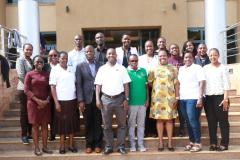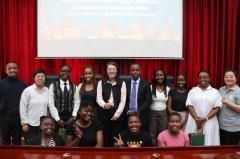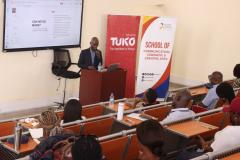Master of Arts in Communication Studies
.gif)
Master of Arts in Communication Studies
The Masters of Arts in Communication Studies was launched in January 2015 after a rigorous curriculum development process and the hiring of additional highly qualified faculty. Approved internationally by WASC, the program plays an important role in the professionalization of communications practice in Kenya and the region. Unlike most of the existing similar programs, our program focuses on addressing the changing communication landscape marked by convergent technologies. It also focuses on honing strategic communication management skills by offering specializations in digital, media, development and corporate communications. With a strong emphasis on digital and management skills, this program provides opportunities for students graduating from undergraduate programs, including USIU-Africa’s Journalism program, as well as practitioners in the field looking to further their skills and knowledge in the field of communication.
Importantly, the M.A. in Communications Studies brings together conceptual, research, and practical approaches through use of technology so as to prepare graduates to handle communication challenges in the current technological environment - including digital and mobile platforms. We employ pedagogical methods that put students at the center of learning. Some of these methods include case studies, direct instruction, class leadership, guided discovery, community learning, convergent inquiry, divergent inquiry, and constructivism.
Concentrations
The program is anchored on four major concentrations: Communication for Development; Digital Communication, Media Studies, and Strategic Corporate Communications.
Development For Communication
This concentration equips students with skills related to the following: theoretical foundation in communication for development; the strategic use of media in development programs; how to conduct communication advocacy programs; use of communication in policy change; application of strategic communication during emergency situations (e.g. environmental health, food security, national security, financial security and other real world emergencies); the role of public health communication in healthcare programs; and how to evaluate the impact and effectiveness of organization programs. Thus, students who pursue the Communication for Development specialization end-up taking careers as communication, monitoring, and evaluation officers or consultants in Non-Governmental Organizations or Non-Profit Organizations.
Digital Communication
Students specializing in Digital Communication gain skills related to the following: theoretical foundation in new media and technology; designing and implementing multimedia (or digital media strategies) projects; the use of technology at the intersection of media and society; effective digital communication strategies; practical applications of digital communications; identifying branding within a digital context; developing online brand identity for organizations; analyzing critical communications related to organizational websites; use of social media tools (e.g. blogging, Twitter, social networking, podcasting, online video); and developing social media plans for organizations. This area of specialization prepares students to use communications technologies in a variety of careers and setting – including film and video editing, website designing, digital journalism, graphic design, marketing, and non-profit communication.
Strategic Corporate Communication
Our Strategic Corporate Communication concentration equips graduates with skills related, but not limited to: theoretical foundations in corporate communications; corporate communication management; corporate communication practices; developing communication strategies; integrating marketing communication; writing for public relations; crisis management; leadership in corporate communications; and evaluation strategic communication programs. Students in this concentration secure jobs as advertising managers, campaign managers, marketing managers, political consultants, and public relations managers.
Media Studies
The Media Studies concentration provides students with such skills as critical examination of the power and influence of media in society; writing for multimedia environmental; synthesizing and integrating multimedia skills; principles of Internet writing; political communication at the intersection of media and politics; media representation of different groups (e.g. minorities); media management; use of media in social movements; quantitative and qualitative research skills in media; and the structure and functions of mass communication systems in political economy. Students pursuing this concentration get jobs as media planners, multimedia specialists, program researchers, market researchers; and communication researchers.
Duration
Our program takes two years to complete and all students must graduate with a cumulative GPA of above 3.0. The program requires 48 credits hours, which are structured as follows: 27 credit hours for core course; 15 credit hours for areas of concentrations, and 6 credit hours for elective courses. For successful completion of this program, students are required to undertake a project, which entails engaging in service learning and writing a report under the supervision of a faculty member in the program.
Admission Requirements
The program requires the following of all applicants for admission:
Admissions are done in spring semester every year. Applicants must have a first degree in Communication, or Journalism, Public Relations, Advertising or related subject with a minimum GPA of 3.0 or its equivalent.
Applicants who have at least 3 years field experience in a Communications or related role will be considered.
In addition to the degree requirements for admission, the following are University wide graduate admission requirements:-
- Proof of graduation from secondary/high school or signed attestation on the USIU application form or its equivalent (including month and year);
- Official transcripts of all college work undertaken (degrees and dates awarded must be posted);
- Submission of a two-page essay addressing the following two topics:
What experiences led you to select your professional objectives?
What other two factors would you like to be considered in evaluating your application?
- Two letters of recommendation.
*Non-East Africans will pay 25% above local rates for tuition and all mandatory charges i.e. tuition, Library, Medical and student activity fees.
** Fees are subject to an annual review
*** Project / Thesis: Graduate students are required to be continuously enrolled during every semester while their thesis / Project remains incomplete. In the first semester, the project/thesis is charged as a full three (3) unit graduate course, while the two (2) subsequent terms are charged at 50% of the tuition. Other charges remain the same.
If the project / thesis extend beyond the third term, then tuition reverts to full charge.
*** Fee balances: Interest of 1.5% will be charged on fees outstanding balance at any one time.
Application forms for admission may be obtained from the USIU website or by contacting:
Admissions Office,
United States International University-Africa,
P.O. Box 14634-00800,
Nairobi, Kenya.
Telephone: 254-20-3606000/3606300
Fax: 254-20-3606100
E-mail: admit@usiu.ac.ke
Curriculum
Core Courses (27 Units)
MAC6010 Introduction to Graduate Studies 3
MAC6020 Communication Theory 3
MAC6030 Introduction to the Digital Age 3
MAC6040 Entrepreneurship for Communication Professionals 3
MAC6050 Communication Research Methods 3
MAC6060 Global Communication 3
MAC6120 Organizational Communication 3
MAC6850 Project 6
Concentrations
Strategic Corporate Communications (15 Units)
SCC6110 Corporate Communication 3
SCC6130 Managing the Communication Function 3
SCC6140 PR Writing 3
SCC6160 Issues & Crisis Management 3
SCC6170 Communications Strategies and Campaigns 3
Digital Communication (15 Units)
DCM6110 Multimedia Design 3
DCM6130 Digital Communication Strategy 3
DCM6140 Online Corporate Branding 3
DCM6160 Effective Web Design and Strategy 3
DCM6170 Social Media Strategies 3
Communication for Development (15 Units)
CFD6110 Development Communication Theory 3
CFD6120 Participatory Communication Strategy Design 3
CFD6130 Public Policy & Advocacy 3
CFD6140 Risk Communication 3
CFD6170 Program Monitoring & Evaluation 3
Media Studies (15 Units)
MDS6110 Media Criticism and Theory 3
MDS6120 Media Writing 3
MDS6140 Media, Identity and Representation 3
MDS6160 Multimedia Journalism 3
MDS6170 Media Management 3





